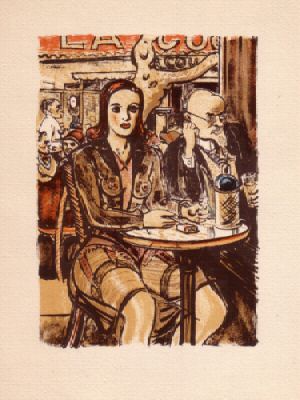Studio 60 on the Implausible Premise
So I was watching Studio 60 On the Sunset Strip. And it's pretty bad. I watched it when it first came on because I enjoyed The West Wing (Studio 60 is made by the same people). The West Wing wasn't the best show ever, but it was pretty good--best thing on on of the Big Three anyway. But now that Studio 60 officially cancelled, and NBC is just burning off the last few episodes, it's so bad it's gone around right past good and back to bad again. And watching Studio 60 has taught me two things.
First, WW was good in no small part due to the actors. Martin Sheen, Allison Janney, Dule Hill, John Spencer, and Stockard Channing were carrying the show on the strength on their reading and rhythm. This is significant over and above the significance of quality acting on other shows because WW and Studio 60 were both Aaron Sorkin shows, and Sorkin was seen, and let himself be seen as the animating force behind both shows. As though it was his writing that made the television, and not actors. You can see it in the lines. Sorkin writes with one voice: his--and he sticks it in the mouth of every one of his actors. The whole universe contained in one of his shows is just Aaron Sorkin's interior monologue working itself out.
And this leads me to the second thing that I learned: WW was good and S60 sucks because Sorkin isn't a good writer, he's just good at creating chaos and resolving it in pretentious ways. This works for the White House with the chaos of world events being ably portrayed, and the high drama of real world stakes in politics and high rhetoric of statesmanship ably cover the pretentious whining and self-regard.
But TV itself just isn't that important. So a behind-the-scenes look at a fictional SNL type show just isn't the proper stage for Sorkin's bluster. Thus does Studio 60 fail.
It doesn't help that the man clearly has such a high regard for himself that he's imbued his protagonists with every aspect of his own character without seeing the flaws in their (his) personality. Which make his leads completely unsympathetic. It also doesn't help that he's so self-serious that he isn't funny. Since the eponymous show within the show is supposed to be funny, this is a problem for reasons of verisimilitude. I mean, really, are we to believe that Sorkin couldn't russel up a couple of proven comedy writers willing to do touch-up work in L.A.? Shit, I have a couple names I could give him.
Sorkin has this idee fixe that the effort one puts in one's job to create truly great work is a transcendent experience. This is well and good, and a good chunk of people would agree with Sorkin. This is even a great theory for the making of good television: the pride people can take in their labor, and the struggle to find honor and meaning in their work. But the problem, again, is that Sorkin can't see beyond his own nose.
See, Aaron Sorkin seems to be of the opinion that we live in a meritocracy, and that is silly. All of his people in high places are honorable and good and smart because their virtue is what propelled them to high places. Also, everyone on a Sorkin show is in a high place. When on a recent episode of S60 the prop-masters for the show when on strike, they were never shown, their reasons were never given, the audience only knew that their union had called a strike and that one of the protagonists (Danny Trip, inably performed by Bradley Whitford) was dealing with them harshly. The message was: "How dare these prop guys strike, they should grovel at the chance to work with geniuses like the cast and producers of S60." See, in Sorkin's world, the actual labor of things is not considered the real work. Only the collaborative creative process that sets policy and makes decisions is work. So writers, lawyers, producers, executives, Presidential aides, are all heroes in their work; but prop guys, teamsters, factory workers, and local cops are peons whose petty concerns about money and hours (the philistines!) are ruining America.
It doesn't occur to him that the prop-master makes a fraction of what the writers, cast and producers of a show make. That the prop-master is concerned about doing a good show because he cares about doing good work, but that he is more concerned about his daughter's college tuition, or his son's case of the measles. This doesn't enter the Sorkin's calculus. And that's a shame because that would have been a good show. If you want to go behind the scenes, go behind the scenes...tell me something about the production of a television show that I don't know, tell me about the logistics and the drama inherent in the conflict of all those people, all those egos. Instead we get how great everyone is because they are all geniuses and awesome at everything, yay! Ever been to legal staff meeting or a reception for students an faculty at an elite college? It's boring. Ever been to a cowboy bar, or heard dirty jokes told at a job site, or listened to union men tell stories about strikes? It's awesome and entertaining.
Sorkin is what we call a limousine liberal. He thinks all the right things and says all the right things, and cares about the environment and health care and affirmative action. But he can't see that politics transcends biography. If it meant realizing that there is not a meritocracy, that wealth and income and talent and virtue do not always line up, but rather must be aligned through often unsavory means that include taking 37% of Sorkin's paycheck every year (which he has complained about on his shows--the liberal ends are okay, but not the means, that would mean Sorkin himself must contribute to society beyond his terrible television scripts). If that were so, and it is, Sorkin would be lost because he sees people as the sum of their resumes. He doesn't show that person to be good, or sympathetic, or sinister, or caring, he just reads you their resume.
All of the lawyers on Sorkin's shows went to Harvard or Standford law schools, because that is where all good lawyers come from. All the actors went to Northwestern or Yale drama programs. The President is religious (as even Sorkin realizes he must be) but he's a liberal Catholic, not an evangelical Protestant. And he went to Notre Dame, but Sorkin makes clear that he got into Harvard and Williams, just so you know he's not shanty Irish or anything.
All the Doctors went to Johns Hopkins, and all the military personnel are the best fucking fighter in their squadron with like 8 medals of honors or something.
In real life half the senior partners went to Loyola or U of Miami. Most successful actors went to high school, the Presidents do disproportionately attend Harvard, that's true, but Truman and Lincoln never went and Reagan and Nixon, I don't even know the names of the two-room colleges they attended. And a lot of dudes in the military (like in every job) are dicks and losers. That's what makes them good, or sympathetic, or sinister. Their actual lives, not their resumes.
In the end S60 failed for two reasons: 1) it was a comedy show that wasn't funny, and 2) people were okay being preached at by the President, they even want it, it felt like actual intellectual leadership from the White House (even if a lot of Sorkin's politics appeared to be kind of naive); but they sure as shit weren't going to be preached to by some schmucks on a comedy show that isn't even funny. If you're going to exalt work above all else, and make resumes more important than personalities, you have to make sure you are doing a good job in the first place.
First, WW was good in no small part due to the actors. Martin Sheen, Allison Janney, Dule Hill, John Spencer, and Stockard Channing were carrying the show on the strength on their reading and rhythm. This is significant over and above the significance of quality acting on other shows because WW and Studio 60 were both Aaron Sorkin shows, and Sorkin was seen, and let himself be seen as the animating force behind both shows. As though it was his writing that made the television, and not actors. You can see it in the lines. Sorkin writes with one voice: his--and he sticks it in the mouth of every one of his actors. The whole universe contained in one of his shows is just Aaron Sorkin's interior monologue working itself out.
And this leads me to the second thing that I learned: WW was good and S60 sucks because Sorkin isn't a good writer, he's just good at creating chaos and resolving it in pretentious ways. This works for the White House with the chaos of world events being ably portrayed, and the high drama of real world stakes in politics and high rhetoric of statesmanship ably cover the pretentious whining and self-regard.
But TV itself just isn't that important. So a behind-the-scenes look at a fictional SNL type show just isn't the proper stage for Sorkin's bluster. Thus does Studio 60 fail.
It doesn't help that the man clearly has such a high regard for himself that he's imbued his protagonists with every aspect of his own character without seeing the flaws in their (his) personality. Which make his leads completely unsympathetic. It also doesn't help that he's so self-serious that he isn't funny. Since the eponymous show within the show is supposed to be funny, this is a problem for reasons of verisimilitude. I mean, really, are we to believe that Sorkin couldn't russel up a couple of proven comedy writers willing to do touch-up work in L.A.? Shit, I have a couple names I could give him.
Sorkin has this idee fixe that the effort one puts in one's job to create truly great work is a transcendent experience. This is well and good, and a good chunk of people would agree with Sorkin. This is even a great theory for the making of good television: the pride people can take in their labor, and the struggle to find honor and meaning in their work. But the problem, again, is that Sorkin can't see beyond his own nose.
See, Aaron Sorkin seems to be of the opinion that we live in a meritocracy, and that is silly. All of his people in high places are honorable and good and smart because their virtue is what propelled them to high places. Also, everyone on a Sorkin show is in a high place. When on a recent episode of S60 the prop-masters for the show when on strike, they were never shown, their reasons were never given, the audience only knew that their union had called a strike and that one of the protagonists (Danny Trip, inably performed by Bradley Whitford) was dealing with them harshly. The message was: "How dare these prop guys strike, they should grovel at the chance to work with geniuses like the cast and producers of S60." See, in Sorkin's world, the actual labor of things is not considered the real work. Only the collaborative creative process that sets policy and makes decisions is work. So writers, lawyers, producers, executives, Presidential aides, are all heroes in their work; but prop guys, teamsters, factory workers, and local cops are peons whose petty concerns about money and hours (the philistines!) are ruining America.
It doesn't occur to him that the prop-master makes a fraction of what the writers, cast and producers of a show make. That the prop-master is concerned about doing a good show because he cares about doing good work, but that he is more concerned about his daughter's college tuition, or his son's case of the measles. This doesn't enter the Sorkin's calculus. And that's a shame because that would have been a good show. If you want to go behind the scenes, go behind the scenes...tell me something about the production of a television show that I don't know, tell me about the logistics and the drama inherent in the conflict of all those people, all those egos. Instead we get how great everyone is because they are all geniuses and awesome at everything, yay! Ever been to legal staff meeting or a reception for students an faculty at an elite college? It's boring. Ever been to a cowboy bar, or heard dirty jokes told at a job site, or listened to union men tell stories about strikes? It's awesome and entertaining.
Sorkin is what we call a limousine liberal. He thinks all the right things and says all the right things, and cares about the environment and health care and affirmative action. But he can't see that politics transcends biography. If it meant realizing that there is not a meritocracy, that wealth and income and talent and virtue do not always line up, but rather must be aligned through often unsavory means that include taking 37% of Sorkin's paycheck every year (which he has complained about on his shows--the liberal ends are okay, but not the means, that would mean Sorkin himself must contribute to society beyond his terrible television scripts). If that were so, and it is, Sorkin would be lost because he sees people as the sum of their resumes. He doesn't show that person to be good, or sympathetic, or sinister, or caring, he just reads you their resume.
All of the lawyers on Sorkin's shows went to Harvard or Standford law schools, because that is where all good lawyers come from. All the actors went to Northwestern or Yale drama programs. The President is religious (as even Sorkin realizes he must be) but he's a liberal Catholic, not an evangelical Protestant. And he went to Notre Dame, but Sorkin makes clear that he got into Harvard and Williams, just so you know he's not shanty Irish or anything.
All the Doctors went to Johns Hopkins, and all the military personnel are the best fucking fighter in their squadron with like 8 medals of honors or something.
In real life half the senior partners went to Loyola or U of Miami. Most successful actors went to high school, the Presidents do disproportionately attend Harvard, that's true, but Truman and Lincoln never went and Reagan and Nixon, I don't even know the names of the two-room colleges they attended. And a lot of dudes in the military (like in every job) are dicks and losers. That's what makes them good, or sympathetic, or sinister. Their actual lives, not their resumes.
In the end S60 failed for two reasons: 1) it was a comedy show that wasn't funny, and 2) people were okay being preached at by the President, they even want it, it felt like actual intellectual leadership from the White House (even if a lot of Sorkin's politics appeared to be kind of naive); but they sure as shit weren't going to be preached to by some schmucks on a comedy show that isn't even funny. If you're going to exalt work above all else, and make resumes more important than personalities, you have to make sure you are doing a good job in the first place.
Labels: random nonsense, television, work






0 Comments:
Post a Comment
<< Home